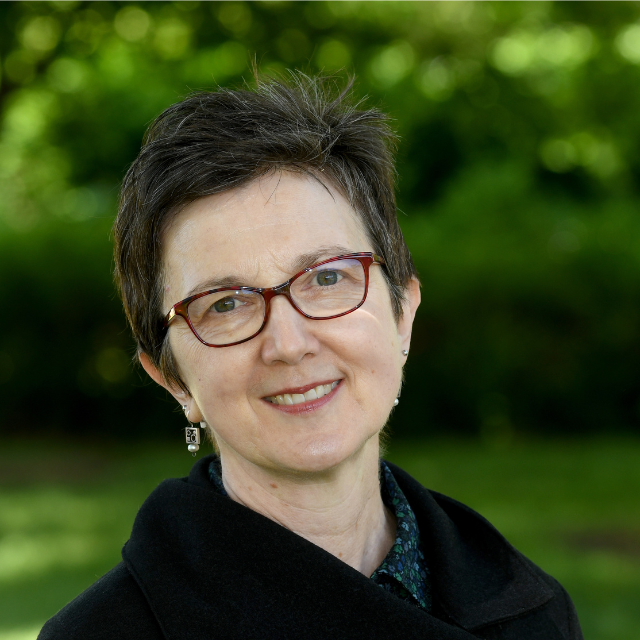Contact Information
Biography
Faith Barrett’s research focuses on 19th century American poetry, considering how
this body of work shapes conversations about national identity and citizenship rights
for all Americans from the 1830’s through the 1870’s. With Cristanne Miller, she coedited
Words for the Hour: A New Anthology of American Civil War Poetry (University of Massachusetts
Press, 2005). She is the author of To Fight Aloud Is Very Brave: American Poetry and
the Civil War (University of Massachusetts Press, 2012) and she has published articles
on the poetry of Abraham Lincoln, Emily Dickinson, Phoebe Cary, George Moses Horton
and Dave the Potter, among other writers. In support of her research, she has received
fellowships from the American Antiquarian Society, the Library Company of Philadelphia
and the National Endowment for the Humanities, among other others. Focusing on the
poetry written and read by African Americans between 1830 and 1850, her current book
project argues that this body of work uses arresting images of natural environments
to call for civil rights for Black Americans.
Education
- Ph.D., Comparative Literature, University of California, Berkeley, 2000
- M.F.A., Poetry, University of Iowa, 1993
- M.A., Comparative Literature, University of California, Berkeley, 1990
- B.A., Comparative Literature, Swarthmore College, 1987
Profile Information
- "'What Witty Sally': Phoebe Cary's Poetics of Parody." A History of Nineteenth-Century American Women's Poetry. Eds. Jennifer Putzi and Alexandra Socarides. New York: Cambridge University Press, 2016. 203-218.
- "'Naked Genius': The Civil War Poems of George Moses Horton." The Literary Cultures of the American Civil War. Ed. Timothy Sweet. Athens: University of Georgia Press, 2016. 77-96.
- "Constituting Communities: Reading the Civil War in Poetry and Song." Approaches to Teaching the Civil War. Ed. Colleen Boggs. New York: Modern Language Association, 2016.71-80.
- "Imitation and Resistance in Civil War Poetry and Song." A History of American Civil War Literature. Ed. Coleman Hutchison. New York: Cambridge University Press, 2015. 96-118.
- "American Poetry Fights the Civil War." Eds. Alfred Bendixen and Stephen Burt. Cambridge History of American Poetry. London: Cambridge University Press, 2014. 306-328.
- "Emily Dickinson, Slavery, and the Civil War." Emily Dickinson in Context. Eliza Richards, ed. London: Cambridge University Press, 2013. 206-215.
- "To Fight Aloud Is Very Brave": American Poetry and the Civil War. My first book examines how poets define their allegiances to the nation in the Civil War era. In analyzing a cross-section of literary and popular poets as well as unpublished soldier-poets, I examine these writers' conflicting responses to poetry's political aims, demonstrating that poetry plays a vital role in helping to define new versions of American identity. University of Massachusetts Press, 2012.
- "Abraham Lincoln and Poetry." Cambridge Companion to Abraham Lincoln. Shirley Samuels, ed. London: Cambridge University Press, 2012. 22-39.
- "'Drums off the Phantom Battlements': Dickinson's War Poems in Discursive Context." Emily Dickinson Companion. Mary Loeffelholz and Martha Nell Smith, eds. Oxford: Blackwell, 2008. 107-132.
- "'They answered him aloud': Popular Voice and Nationalist Discourse in Melville's Battle-Pieces." Leviathan: A Journal of Melville Studies 9 (2007): 35-49.
- Review essay: "Public Selves and Private Spheres: Studies of Emily Dickinson and the Civil War, 1984-2007." Emily Dickinson Journal 16.1 (2007): 92-104.
- "Words for the Hour": A New Anthology of American Civil War Poetry. An anthology co-edited with Cristanne Miller for which I wrote the introductory essay. Amherst, MA: University of Massachusetts Press, 2005.
- "Addresses to a Divided Nation: Images of War in Emily Dickinson and Walt Whitman." Arizona Quarterly 61.4 (Winter 2005): 67-99.
- "Inclusion and Exclusion: Fictions of Self and Nation in Whitman and Dickinson." Emily Dickinson Journal 5.2 (1996): 240-46.
- Maine Women Writer's Collection travel grant, University of New England, August 2014.
- American Antiquarian Society fellowship, Worcester, MA, May 2014.
- National Endowment for the Humanities fellowship, part of the "We the People" initiative, January-February 2007.
- American Antiquarian Society fellowship, Worcester, MA, September 2006.
- Young Teacher Award, an award for excellence in teaching given to one junior faculty member each year. Lawrence University, Spring 2006.
- W. M. Keck and Fletcher Jones Foundation Fellow, Huntington Library, San Marino, April-May 2003.
- Fulbright scholarship to West Germany, 1987-88.
My past research has included two projects focused on American Civil War Poetry: To
Fight Aloud Is Very Brave American Poetry and the Civil War (University of Massachusetts,
2012) and Words for the Hour: A New Anthology of American Civil War Poetry, coedited
with Cristanne Miller (University of Massachusetts, 2005). I am currently working on a second book project that focuses on local poetry culture
in the mid-nineteenth century, considering how self-educated writers use the reading,
collecting, and writing of poetry to establish political communities and to protest
both slavery and limitations in women's legal rights.


